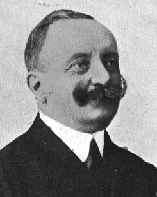Luigi Facta
| Luigi Facta | |
|---|---|
 | |
| 26th Prime Minister of Italy | |
|
In office February 26, 1922 – October 31, 1922 | |
| Monarch | Victor Emmanuel III |
| Preceded by | Ivanoe Bonomi |
| Succeeded by | Benito Mussolini |
| Personal details | |
| Born |
November 16, 1861 Pinerolo, Italy |
| Died |
November 5, 1930 (aged 68) Pinerolo, Italy |
| Political party |
Historical Left (1892-1913) Italian Liberal Party (1913-1926) |
| Religion | Roman Catholicism |
Luigi Facta (November 16, 1861, Pinerolo, Province of Turin – November 5, 1930, Pinerolo) was an Italian politician, journalist and last Prime Minister of Italy before the leadership of Benito Mussolini.
Facta was born in Pinerolo, Piedmont, Italy. He studied law and later became a journalist. He entered politics in 1892 when he was elected to the chamber of deputies for Pinerolo, a seat which he held for 30 years. Facta, a member of the Liberal Party, served as undersecretary of the justice and interior departments in the coalition cabinets for much of his time in Parliament. He was also finance minister from 1910 until 1914 and 1920 until 1921. At the outbreak of World War I, Facta supported neutrality for Italy, but then supported the war when Italy entered it. His son was killed in the war, and he said that he was proud to give a son to his country.
Facta was appointed Prime Minister in February 1922. At the time, Italy was in political turmoil, and was dealing with Mussolini's fascist insurgency. When Mussolini decided to march on Rome, Facta reacted and wanted to declare the martial law and send the army to stop Mussolini. Such a declaration needed to bear the monarch's signature before it could take effect. Facta always refused to explain the secret reasons that brought the King Victor Emmanuel III not to sign the declaration of emergency. The following day Facta and his government resigned to demonstrate they did not approve the King's decision. The King then asked Mussolini to form a new government.
In 1924, King Victor Emmanuel III named Facta senator.
Facta died in Pinerolo, Italy, in 1930 with the general population believing him to have been too feeble and faithful to the King to take a more active role in stopping Mussolini and the rise of Fascism.[1]
References
| Preceded by Ivanoe Bonomi |
Prime Minister of Italy 1922 |
Succeeded by Benito Mussolini |
| Preceded by Ivanoe Bonomi |
Italian Minister of the Interior 1922 |
Succeeded by Paolino Taddei |
.svg.png)
